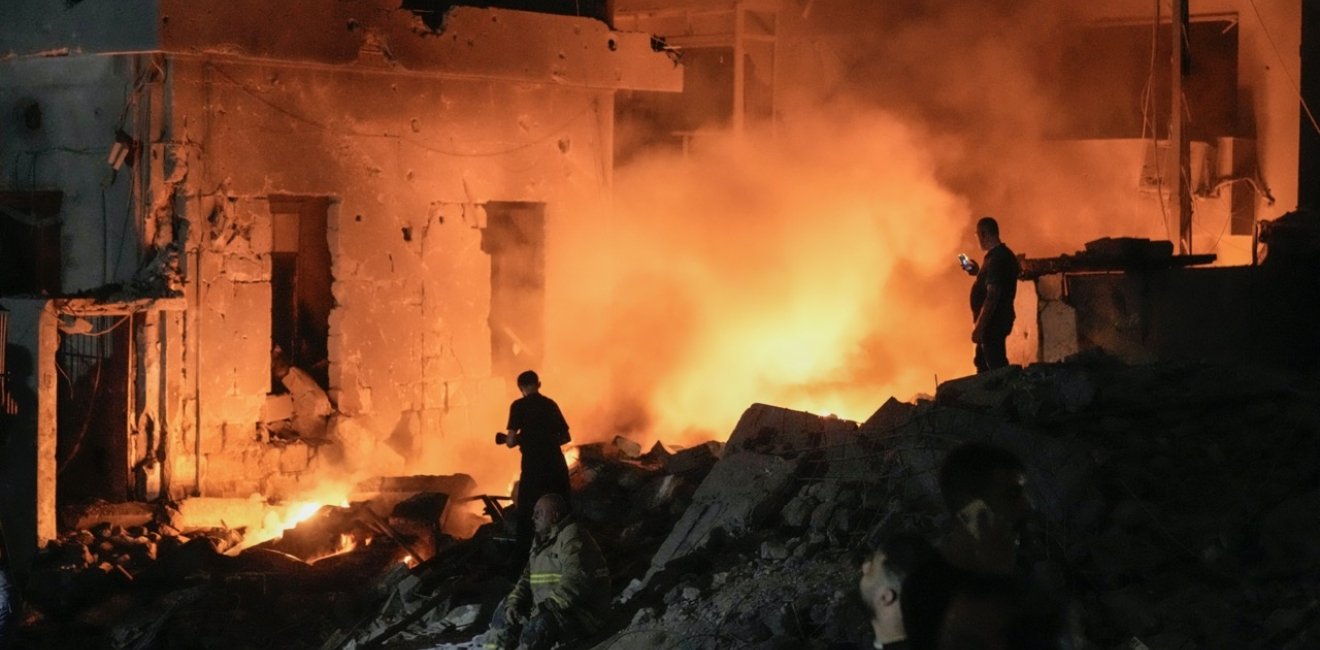As I sit down to write, I watch in anguish as my homeland is torn apart on television—a nation being shattered before my eyes. The images are haunting: homes reduced to rubble, streets overflowing with makeshift tents for displaced families, and lives uprooted in an instant. For those of us witnessing this from abroad, the pain is intensified by the helplessness of distance. We are not merely watching a war; we are witnessing the slow, systematic disintegration of a country that once held so much promise. Lebanon is slipping away, and what makes it even harder to bear is the fact that we can do little more than watch.
This catastrophe didn’t emerge overnight; it is the result of decades of corruption, mismanagement, and the exploitation of Lebanon’s vulnerabilities by external powers.
People often ask if there is any glimmer of hope left for Lebanon, but the reality is grim. Lebanon is no longer on the brink—it has plunged into freefall. What was already a fragile state, crippled by division and dysfunction, is now being ravaged by war, compounding an economic crisis that has left millions in poverty and a political system in complete paralysis. This catastrophe didn’t emerge overnight; it is the result of decades of corruption, mismanagement, and the exploitation of Lebanon’s vulnerabilities by external powers. Each blow drags Lebanon deeper into chaos, with regional actors capitalizing on the country’s instability for their own gain, while Lebanon’s leaders either stand idle or lack the will to reverse the collapse.
Lebanon has become more than just a battleground for foreign agendas—it has become a place where the dreams of its people are systematically crushed under the weight of forces beyond their control. Those who once believed in Lebanon’s promise, in its rich culture and resilience, now watch as their hopes fade. It is not only the physical destruction of homes or the loss of livelihoods that cuts so deeply; it is the theft of a future, the slow erasure of a country we once knew and loved. The tragedy is not just that Lebanon is slipping away—it’s that we, its people, are powerless to stop it.
A nation in freefall
Since 2019, the Lebanese pound has lost over 98% of its value, wiping out life savings and leaving citizens grappling with the daily struggle to afford basic necessities. Inflation has skyrocketed beyond 250%, making essentials like food, medicine, and fuel unattainable for most. The country, which relies on imports for more than 80% of its goods, is caught in a vicious cycle of rising costs and shrinking resources. Lebanon's GDP has contracted by nearly 60% over the past four years, and without intervention, the economy is expected to shrink even further, with expected annual contractions in the range of 10-15% annually. Meanwhile, Lebanon’s foreign reserves have dwindled from $30 billion in 2019 to a mere $8.5 billion today, a stark reminder that the country is on the verge of complete economic collapse.
Expecting the same leaders who drove Lebanon into collapse to now deliver the reforms necessary to rescue it is akin to asking arsonists to rebuild the house they set ablaze.
Lebanon’s deep-rooted political dysfunction has only worsened the country's devastation, leaving it without a president for nearly two years and a caretaker government that is powerless to address its escalating crises. For years, activists, particularly in Washington, have urged Lebanon’s corrupt sectarian leaders to implement reforms, believing political leadership could steer the nation toward recovery. However, this hope is increasingly misplaced. Expecting the same leaders who drove Lebanon into collapse to now deliver the reforms necessary to rescue it is akin to asking arsonists to rebuild the house they set ablaze.
As the crises and war intensify, these activists along with some Lebanese factions have shifted their focus to electing a new president, hoping this might offer a pathway to recovery. Yet, this approach is superficial at best. Electing a new president from the same political class responsible for Lebanon’s collapse will not change the underlying dynamics. Even if a new leader is chosen, they will likely have to negotiate with Hezbollah, further entrenching the status quo and stifling meaningful reform.
At the same time, external forces are exacerbating Lebanon’s instability. Israel is intensifying its military offensive, taking advantage of the United States’ distraction with its upcoming elections. Regional powers are leveraging Lebanon’s vulnerability to serve their own interests, trapping the country in a geopolitical struggle that overshadows any real potential for internal change.
The true tragedy is that Lebanon’s people—the real victims—are caught between these internal failures and external ambitions. Whether through electing a president or calling for reforms, Lebanon’s political system is fundamentally ill-equipped to resolve its own crisis. The country needs far more than just a new figurehead; it requires a comprehensive overhaul, something its current political elite is unlikely to deliver. The longer this political charade continues, the deeper Lebanon will fall into the abyss.
What Lebanon really needs
Lebanon is at a crossroads. Without intervention, the country risks fragmenting into enclaves controlled by warlords and foreign interests. What Lebanon needs is real, systemic change—a path that no president, elected under the current conditions, can offer.
To ensure Lebanon doesn’t spiral back into instability, a comprehensive strategy is required, focusing on the disarmament of militias and the restoration of the state’s sovereignty.
The immediate priority must be an internationally backed ceasefire, supported by the United States, France, and other global powers, to stop the destruction and allow humanitarian aid to flow. However, this is just the first step. To ensure Lebanon doesn’t spiral back into instability, a comprehensive strategy is required, focusing on the disarmament of militias and the restoration of the state’s sovereignty. Without these measures, Lebanon will remain vulnerable to external exploitation, making any recovery efforts futile.
At the same time, rebuilding Lebanon’s capacity to maintain security is essential. A key element in this strategy is strengthening the Lebanese Armed Forces (LAF). While Lebanon has received $3 billion in US military aid since 2006, this pales in comparison to the $3.8 billion Israel receives annually. This disparity underscores the need for greater US and international support for the LAF, which remains one of the few neutral institutions capable of restoring order and curbing Hezbollah’s influence. Without increased backing, the LAF will struggle to contain non-state actors, leaving Lebanon vulnerable to further fragmentation and destabilization.
Addressing the structural crisis
Lebanon’s future hinges on immediate, decisive action from the international community. Past efforts, such as the Baabda Declaration and similar neutrality frameworks, have failed to secure Lebanon’s sovereignty. The country’s sectarian political system, combined with the influence of external actors, ensures that political progress will remain elusive unless these broader dynamics are addressed.
Hezbollah’s military presence and the power of sectarian elites make neutrality in Lebanon almost impossible. Electing a president alone, without dismantling these entrenched power structures, will not resolve the crisis. The international community must push for the full enforcement of UN Resolution 1559, which includes the withdrawal of Israeli forces from all Lebanese territories, including Chebaa Farms, and the disarmament of militias. Restoring Lebanon’s sovereignty requires that no group outside the state holds weapons or authority.
In the current political environment, electing a president without addressing these root causes would be both ineffective and dangerous. Any new leader would either come from the same corrupt political elite or be forced to make concessions to Hezbollah, which continues to operate independently of the state.
The stakes are too high for inaction. Lebanon’s collapse would have catastrophic implications, not only for its citizens but for the entire region. A disintegrating Lebanon could create a power vacuum that regional actors would rush to fill, further destabilizing the Middle East. Stabilizing Lebanon is not just a moral imperative—it is a strategic necessity for global security.
The international community must act now. Only through these steps can Lebanon begin the process of rebuilding its state and institutions. Failure to act swiftly will render Lebanon’s tragedy irreversible, with far-reaching consequences for the region’s stability and the world’s security. The time for decisive action is now.
The views expressed in this article are solely those of the author and do not reflect the opinions or positions of any organization with which he is affiliated.








